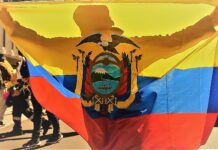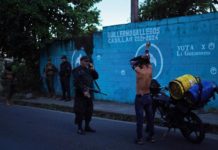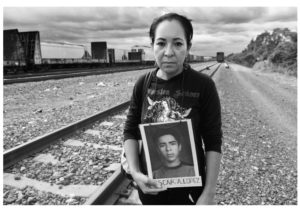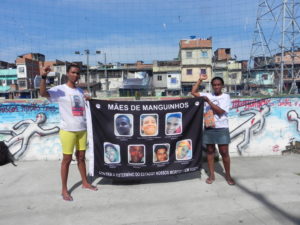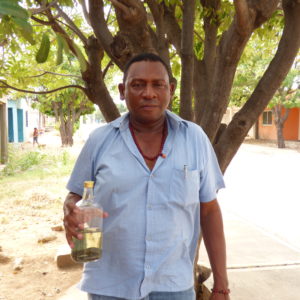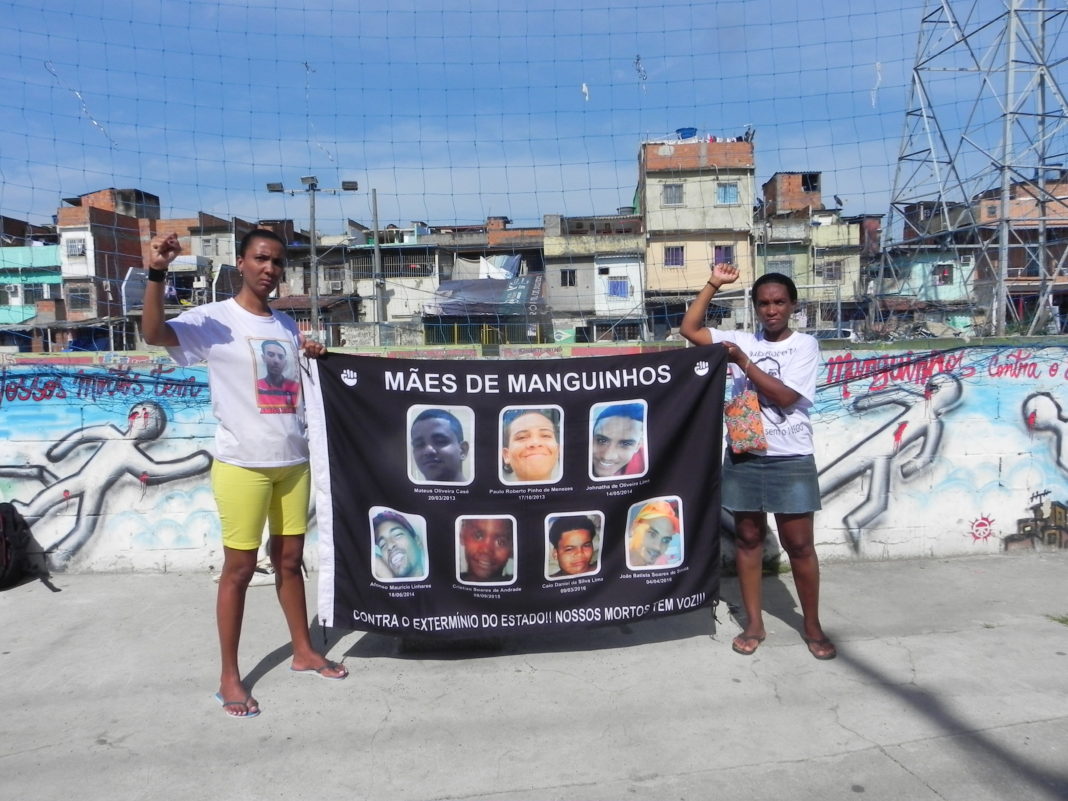
VOLA 8-1
Ana Paula (left) and Fatima, with a banner of some of the young men killed in Manguinhos, Rio de Janeiro, Brazil. © Ali Rocha 2016
Marielle cropped
Marielle Franco, Rio councillor, assassinated 14 March 2018.
© Midia Ninja - Flickr, CC BY-SA 2.
VOLA 8-4
Ana Enamorado, Honduras, with a photo of her son Oscar Antonio. © Francisco Elias Prada/ojos ilegales 2012. From the photo essay Transmigración en Movimiento
VOLA 8-6-2
Hijos and Hijas – sons and daughters of those forcibly disappeared in Colombia– put on a play in memory of their loved ones, 20 August 2016.
© Ricardo Robayo Vallejo
8. State violence, policing, and paramilitaries
Abstract
Policing in Latin America has been increasingly militarized in recent years. Not only has this failed to reduce crime, it kills and injures many innocent people, including children. This violence disproportionately affects the poor, as well as black and indigenous communities. Migrants are frequent targets.
Both state forces and non-state actors such as paramilitary groups may be deployed to protect the operations of extractive industries such as mining, oil drilling, and agribusiness.
Index
News related to this chapter
Chile: Victims of eye trauma tell their stories
Ojos: Memoria de un estallido is a book put together as a memorial for victims of eye trauma suffered as a result of the fight for human rights in Chile. The people whose stories are gathered in this volume were caught up in the so-called Estallido Social, a period of social unrest which occurred between October 2019 and March 2020.
The Estallido began in Santiago de Chile when secondary school students instigated a fare boycott on Santiago’s metro system to protest a recent hike in public transport prices. The authority’s crackdown on the students led to sympathy marches across Chile...
Most dangerous for environmental defenders
At least 177 environmental defenders were killed last year globally, according to a new report from Global Witness. At least 155 of them were in Latin America. Colombia topped the list with 60 murders, Brazil had 34, Honduras 14.
Ecuador: killing leaves deep uncertainty
The assassination of Fernando Villavicencio, one of the leading candidates in the 20 August presidential elections, has plunged Ecuador into deep uncertainty. The Correístas might benefit were some of them not suspected of complicity in the crime.
Second launch event for: CLAMOR by Jan Rocha
A second launch event in London for Jan Rocha's book 'CLAMOR: The search for the disappeared of the South American dictatorships' on 14 June
El Salvador: a cure more harmful than the disease?
A state of emergency and ruthless action by the authorities has dramatically curtailed the activity of gangs which previously ruled vast swathes of El Salvador. But there are many innocent victims and the underlying poverty, inequality and injustice remain untouched.
Videos
K – the story of a search
Bernardo Kucinski's searing memoir 'K' tells the story of the agonised search by a father for his disappeared daughter, kidnapped and eventually murdered by...
Colombian artists reflect on rural violence and memory in short film
The short film is intended as an expression of solidarity with the current strike and its title, Desolvido, translates as ‘unforgetting’; evoking a desire not to forget past moments of beauty even in the face of a violent present.
Santiago Rising: interview with director Nick MacWilliam
Carole Concha Bell interviews Nick MacWilliam about his new Alborada Films documentary 'Santiago Rising', digging deeper into the estallido social in Chile and how to effectively capture the sentiments and events of this social movement.
Salvadorean refugees repatriate to Nueva Esperanza
In 1991 a group of 325 Salvadorean refugees returned to their country after 10 years of exile in Nicaragua. They faced great difficulties in...
I’m here to stay
The reality confronting migrants who manage to cross the Rio Bravo, in pursuit of the famous American dream, but finding themselves, instead, engulfed in...
Mike Gatehouse lived in Chile in 1972-3 and worked for 15 years in London for Latin America solidarity and human rights organizations.
Co-author of LAB’s Soft Drink, Hard Labour – Guatemalan workers take on Coca Cola and In the Mountains of Morazán – Portrait of a returned refugee community in El Salvador, he is an editor at LAB.
Interviewees
Gabriela Díaz (Hijos e Hijas Colombia): interviewed via Skype on 24 February 2018 by Ali Rocha. Translated by Ingrid de Almeida. Ana Enamorado (MMM): interviewed in Mexico City on 14 August 2017 by Carol Byrne. Translated by Carol Byrne. Ana Paula Oliveira and Fatima Pinho (Mães de Manguinhos): interviewed in Rio de Janeiro on 8 December 2016 by Ali Rocha. Translated by Catherine Morgans. Javier Treviño Rangel (CIDE): interviewed in Aguascalientes, Mexico, on 28 February 2017 by Francesco di Bernardo. Transcribed by Andreea Tudose. Rogelio Ustate (Tabaco community): interviewed in Hatonuevo, La Guajira, Colombia, on 7 January 2017 by Emma Banks. Transcribed by Elizabeth Pillares and translated by James Scorer.
References
NB: All web references were checked and still available in May/June 2018 unless otherwise stated.
Amnesty International (2016) “Treated with Indolence” – The State’s Response to Disappearances in Mexico, Amnesty International Report
Burt, J. M. (2012) ‘Quest for human rights justice in Peru suffers serious setbacks’, Foreign Policy in Focus
CEH (1999) ‘Guatemala: memory of silence’, Report of the Commission for Historical Clarification, Conclusions and Recommendations, English summary
Chohan, J.K. (2017) ‘Colombia: incompliance, continued violence and crop eradication’, LAB, 31 October
Cruz, E. (2016) ‘Crimes de Maio causaram 564 mortes em 2006; entenda o caso’, Agência Brasil
El Colombiano (2017) ‘“En Colombia no hay paramilitarismo”: Ministro de Defensa’, 11 January
Gill, S. (2016) ‘Colombia state ties to paramilitary groups alive and well: Report’, Colombia Reports
Hernández, A. and Fisher, S. (2014) ‘Iguala: la historia no oficial’, Proceso
Holocaust Museum (no date) ‘Genocide in Guatemala, 1981–83’, Holocaust Museum, Houston, TX
Huey, D. (2014) ‘The US war on drugs and its legacy in Latin America’, The Guardian, 3 February
Human Rights Watch (2016) ‘“Good cops are afraid” – the toll of unchecked police violence in Rio de Janeiro’, Human Rights Watch
Jardim, L. (2018) ‘Ibope: 50% dos brasileiros acham que ‘bandido bom é bandido morto’, O Globo, 4 March
LAB (forthcoming) Overburden: Community Resistance to Mining in Latin America, Latin America Bureau (LAB) and Practical Action Publishing, Rugby.
Mortensen, T. (2017) ‘Colombia: peace, but maybe not the peace we hoped for’, LAB, 27 November
Ni Bhriain, N. (2016) ‘Colombia: the dark side of peace in Tumaco’, LAB, 20 September
Roxo, S. (2017) ‘“Policial que não mata não é policial” diz Bolsonaro‘, O Globo
Ruge, E. (2017) ‘Mothers of kids killed by police speak out at launch of “No tanks!” campaign against police operations’, RioOnWatch, 15 December
Further reading
General
– Charles, M. (2019) ‘A Split Emerges in Latin America Over How to Deal With Rising Violence’, World Politics Review
– Chavez, R.B. (2018) ‘The Return of Latin America’s Military’, The New York Times
– Clavel, T. (2018) ‘Why Latin America Dominates Global Homicide Rankings’, InSight Crime
– Fuchs Alvarado, G. (2019) ‘Countering hate speech against refugees and migrants: An evaluation of international human rights treaties and soft law instruments‘, Revista Relaciones Internacionales, Universidad Nacional, Costa Rica, No.92.1, January-June 2019
– Kyle, B.J. and Reiter, A.G. (2018) ‘Militarization Redux’, NACLA
– Muggah, R. and Aguirre Tobón, K. (2018) ‘Citizen security in Latin America: Facts and Figures’, Strategic Paper 33, Igarapé Institute
– Muggah, R. and Szabó Carvalho, I. (2017) ‘There’s a cure for Latin America’s murder epidemic – and it doesn’t involve more police or prisons’, World Economic Forum
– Pearce, J. (2018) ‘Elites and Violence in Latin America: Logics of the Fragmented Security State’, Violence, Security, and Peace Working Papers, No. 1, LSE Latin America and Caribbean Centre
– Woody, C. (2015) ‘‘We have seen a significant amount of deaths’: Inside Latin America’s brutal war on crime’, Business Insider
– Yagoub, M. (2017) ‘From Chile to Mexico: Best and Worst of LatAm Police’, InSight Crime
Brazil
– Democracy Now! (2019) ‘“This Is Just the Beginning”: Greenwald on Rising State Violence & Homophobia in Bolsonaro’s Brazil’, Democracy Now!
– Lemgruber, J. and Musumeci, L. (2017) ‘Not all Brazilians believe that criminals have no rights, but a startling number do’, The Conversation
– Reist, S. (2018) ‘The Deadly Genealogy of Bolsonaro’s Favorite Slogan’, Jacobin
– Smith, C. (2018) ‘Lingering Trauma in Brazil: Police Violence Against Black Women’, NACLA
Colombia
Cosoy, N. (2017) ‘Why has Colombia seen a rise in activist murders?’, BBC News
– Friedmann, J. (2018) ‘‘The Only Protection Is God’: Negotiating Faith and Violence in Chocó’, Pulitzer Center
– Mcevoy, K.G. (2018) ‘Britain’s Secret War in Colombia’, Jacobin
– Parkin Daniels, J. (2018) ‘Colombia’s hidden victims finally get their day in court’, The Guardian
– Wesche, P. (2018) ‘The Paramilitary Threat in Post-Conflict Colombia’, NACLA
Mexico
– BBC News (2018) ‘Migrant caravan: What is it and why does it matter?’, BBC News
– Ernst, F. (2018) ‘‘The training stays with you’: the elite Mexican soldiers recruited by cartels’, The Guardian
– Holman, J. (2018) ‘Mexico police officers ‘underpaid, under-equipped’’, Al Jazeera
– Nugent, C. (2018) ‘Mexico Is Suffering Its Bloodiest Year in Modern History. Here’s Why’, Time
– Villegas, P. (2018) ‘An Old Sore for Mexico’s Next President: The 43 Missing Students’, The New York Times



